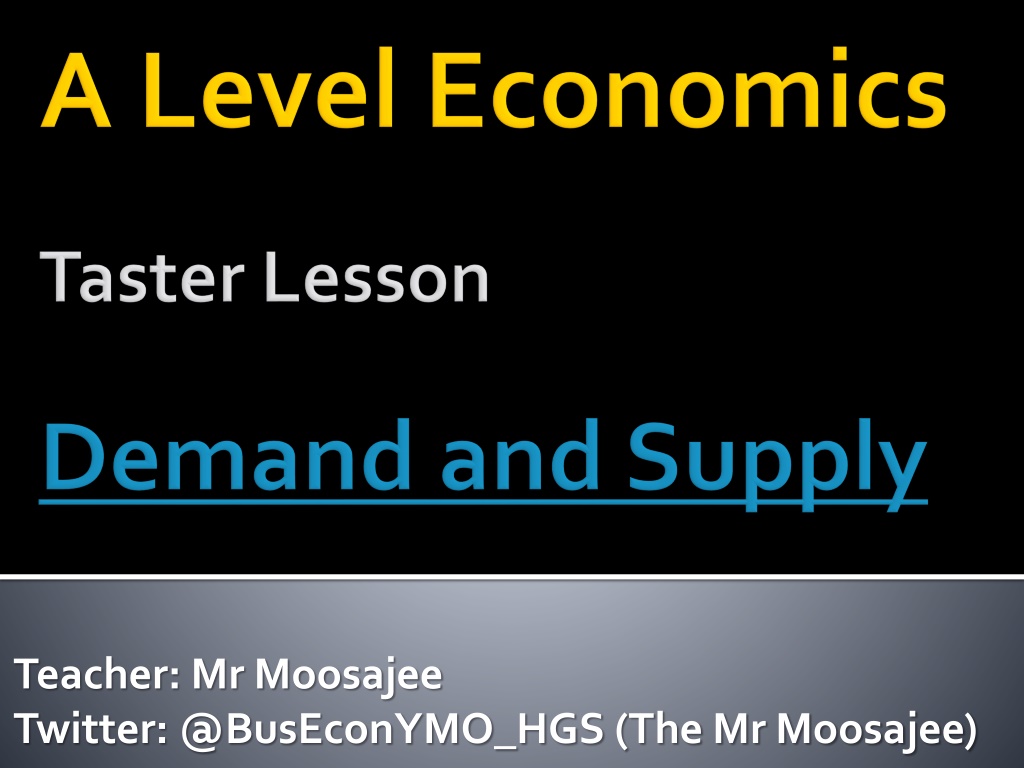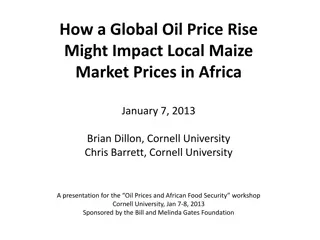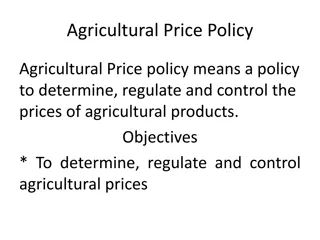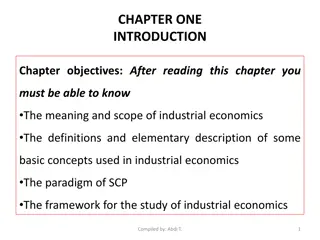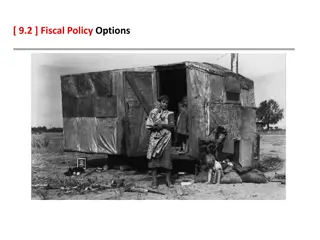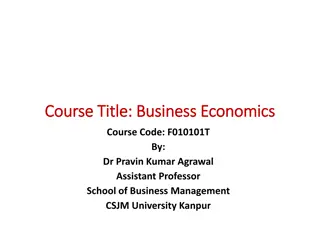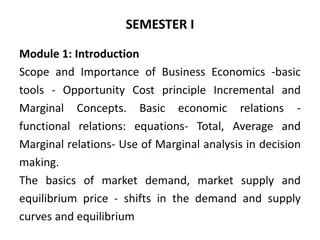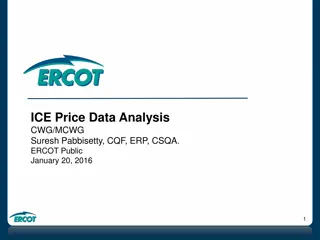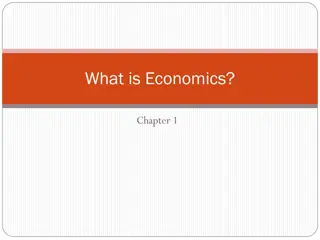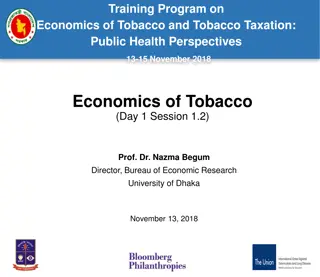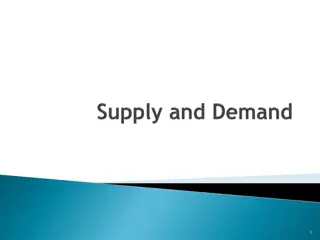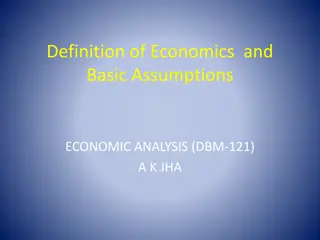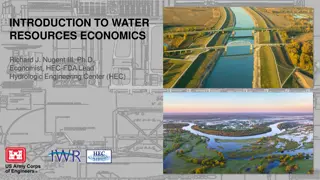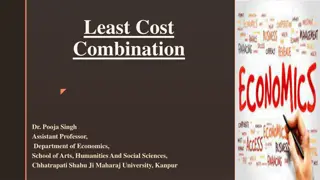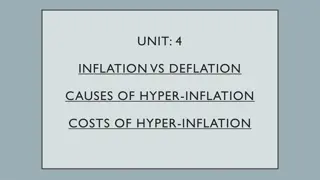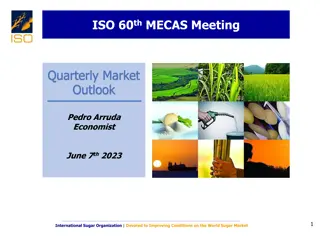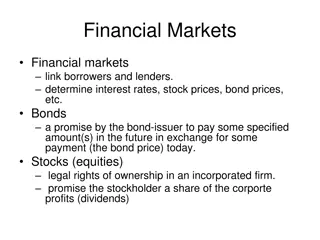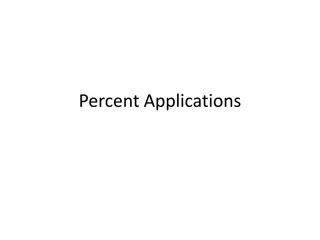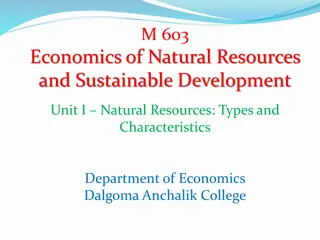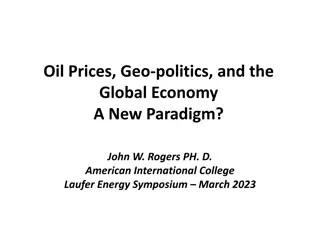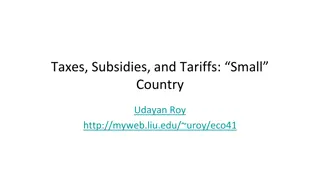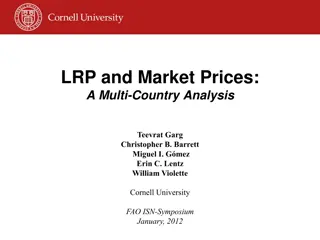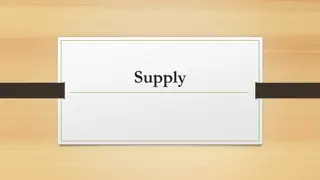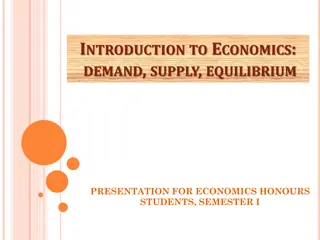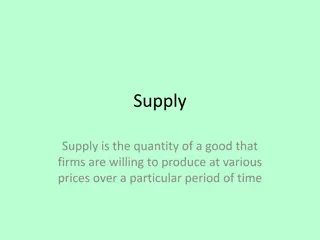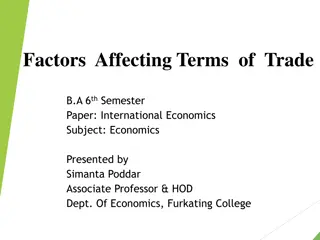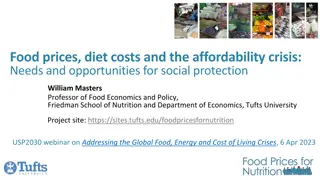Understanding Economics: Explore the World of Scarce Resources, Prices, Government Policies, and Global Impacts
Delve into the intriguing realm of economics with Mr. Moosajee at HGS! Unravel the mysteries behind how scarce resources are allocated, why prices fluctuate, the impact of government policies, concerns about inflation, strategies for reducing unemployment, and more. Discover the relevance of economics in various fields and the practical skills it nurtures, extending beyond the classroom to university study and future professions. Learn with a focus on critical thinking, problem-solving, and real-world application. Join the journey of learning, questioning, and understanding economics at HGS.
Download Presentation

Please find below an Image/Link to download the presentation.
The content on the website is provided AS IS for your information and personal use only. It may not be sold, licensed, or shared on other websites without obtaining consent from the author. Download presentation by click this link. If you encounter any issues during the download, it is possible that the publisher has removed the file from their server.
E N D
Presentation Transcript
Demand and Supply Teacher: Mr Moosajee Twitter: @BusEconYMO_HGS (The Mr Moosajee)
If you ever wonder: How are the world s scarce resources allocated, and why? What factors determine prices and why do they always seem to fluctuate? Why do governments levy taxes on some people and businesses, and give money to other people and businesses What is inflation, and why are so many people concerned about it rising or falling? Why are unemployment levels so high in some countries, and how do you solve it? How do world events affect the success of businesses and the economy in the UK Was Britain right or wrong to vote to leave the European Union (UN) Why is the Coronavirus outbreak having such a huge effect on the global economy What are exchange rates, why are they so variable and why do they matter? Government debt -why does it build up, and how worried should we be about it? What are interest rates, and why do they seem to be so important in decisions made about money? ...then economics is the subject for you.
Anyone interested in knowing more about the way the world works. Students take Economics in combination with a wide array of other subjects - everything from Art, English Literature and History at one end, to Maths, Biology and Physics at the other A strong mathematical background is not strictly important for A level Economics; but an ability to interpret graphs and understanding correlation, percentages and ratios, and spot trends will help Being able to argue the merits and drawbacks of a case, to apply theory to the real world and observe the differences, and be able to make judgements and recommendations is highly important. However, these skills are needed for almost any A level subject you will choose The subject is particularly useful for those students wanting to study Social Science or Medical courses, as making decisions about how, and to whom resources, are allocated are highly important in these professions Many students choose Economics as their third or fourth choice subject, only to find that they enjoy it so much they decide to study it at university-level.
Economics at HGS My approach I don t want to teach you Economics; I want to teach my students how to learn, study and question Economics. At Herschel, we follow the Edexcel Economics A course. The specification document can be found here: https://qualifications.pearson.com/content/dam/pdf/A%20Level/economics- a/2015/specification-and-sample-assessment- materials/A_Level_Econ_A_Spec.pdf For a more detailed understanding of the course, how it assessed, and more importantly, the theories, concepts and models you will study, check out the Getting Started guide: http://qualifications.pearson.com/content/dam/pdf/A%20Level/economics- a/2015/teaching-materials/Getting_Started_Guide_new.pdf This presentation can be found here: http://www.herschel.slough.sch.uk/Curriculum/Economics/A-Level-3
Demand for a product or service refers to the amount consumers are able and willing to buy at a given price. What do you notice happens to the quantity demanded when the price increases (decreases)? Why do you think this happens? What other non-price factors may also have a determining effect on demand? What do you think this will do to the demand curve?
Consumers incomes Level of taxation on incomes Price of Complementary goods Price of Substitute goods Fashion trends and tastes Changes in customers needs Technological progress Changes in population Advertising and promotion Government legislation (laws) Adverse publicity
Supply for a product or service refers to the amount producers (sellers) are able and willing to produce (sell) at a given price. What do you notice happens to the quantity supplied when the price increases? Why do you think this happens? What other non-price factors may also have a determining effect on supply? What do you think this will do to the supply curve?
Profitability of other goods that could be produced instead Changes in production technology Changes in the costs of production Natural disasters, disease and famine Changes to climate and weather Social factors war, civil unrest Level of taxation on goods (VAT and excise duties) Government subsidies (grants and funding) The number of suppliers in the market
Price refers to the amount of money that an individual has to give up to acquire a good or service The market price and quantity can be found where the market clears . Market equilibrium occurs where demand = supply So what happens to the price and quantity if a non- price factor affects demand or supply?
Price serves as a signal in the market, and has an incentivising and rationing function in the market. As we saw, the market clears where demand = supply If there is a SURPLUS, there is EXCESS SUPPLY. This will cause PRICES TO FALL, disincentivising producers to sell, and incentivising consumers, as they will be MORE ABLE AND WILLING to buy the good If there is a SHORTAGE, there is EXCESS DEMAND. This will cause PRICES TO RISE, incentivising producers to sell, and incentivising consumers, as they will be LESS ABLE AND WILLING to buy the good
Markets fail market transactions can often result in spillover costs and benefits affecting others not involved in the transaction. This means markets may not be the most efficient or equitable methods of allocating resources.
Governments can intervene in markets to influence behaviour, or reduce market failure, for example through the use of legislation and/or taxation, but if this action does not improve the situation, we call this a government failure.
Governments can use subsidies or legislation to encourage the production and consumption of products/services which benefit society, or provide these directly. But this will have financial or opportunity costs, and may reduce equity and efficiency.
We will also need to consider the aggregate (total) level of demand and supply in the whole economy (macroeconomics), and different schools of thought on how this is analysed
Not every market is fully competitive. Existence of asymmetric market power between buyers and sellers can influence prices and quantities demanded and supplied. This also affects equity and efficiency.
Work hard from the start AND START READING THE TEXTBOOK FROM THE BEGINNING OF THE COURSE it is very difficult to catch up if you don t Make lots of detailed notes you will need these when revising Complete past exam papers and questions set in class and homework - they help you develop better exam technique Complete the assigned reading before attending lessons this really helps you to keep up with what is being taught, and make connections with the rest of what you are learning Keep up-to-date with the business news it helps connect business theory with the real world. Follow The Mr Moosajee on Twitter. If you get stuck, ask your teacher (and each other) we are all here to help each other
We follow the Edexcel A Level Economics course the exam boards website has lots of information about what you will be studying and how you will be assessed. Three of the better sites to refer to are EconomicsOnline, Tutor2U and YouTube, especially pajholden, EconPlusDal and JodieEconGirl. It has a whole array of economics-based resources, and an excellent blog which will give a great feel for the subject The BBC and Channel 4 News websites are also excellent sources. For a more in-depth study, The Economist and New York Times offer peerless coverage There are many interesting blogs written by economics journalists which give a variety of contrasting views on the state of global economic affairs Twitter is also a great resource. Most of the department s teachers at Herschel, and respected journalists and economists have Twitter accounts, and tweets can include links to helpful resources or up-to-date news stories on what is going on in the Economic world
Economics rules the World As mentioned earlier, my approach is that: I don t want to teach you Economics; I want to teach my students how to learn, study and question Economics. That means you will need to buy and read the textbook. As soon as you have been enrolled on the course in August, get this done: Your Course textbook: Edexcel AS/A Level Economics (sixth edition) Student book + Active Book Anderton, Alain (edited by Dave Gray) (ISBN: 9781447990550) Any Questions? Email me at: ymo@herschel.slough.sch.uk
Using a range of referenced sources found through your independent research, prepare a short essay (750 words maximum) which answers the question below: In recent years, the demand and supply of electric and hybrid vehicles has increased. Analyse a range of market-based and interventionist factors which best explain why this happened. The question is asking, in your judgement, which factors have played the biggest role in influencing demand and supply. This means you need to consider how the factors below play a part. Changing attitudes to the environment? Fashion trends? Government intervention? Firms innovations and improvements to the product? Other reasons (for example, how demand and supply might be influenced by subsidies, taxes, changes in complements and substitutes, the positive and negative spillover effects (externalities) of increased consumption. Ensure you make reference to all the sources you use for your research. For more guidance on the economics concepts, click this link. These articles might help: Why do they love electric cars in the Arctic Circle? (http://www.bbc.co.uk/news/business-36402942) and VW plans huge investment to become electric cars leader (http://www.bbc.co.uk/news/business-36548893)
